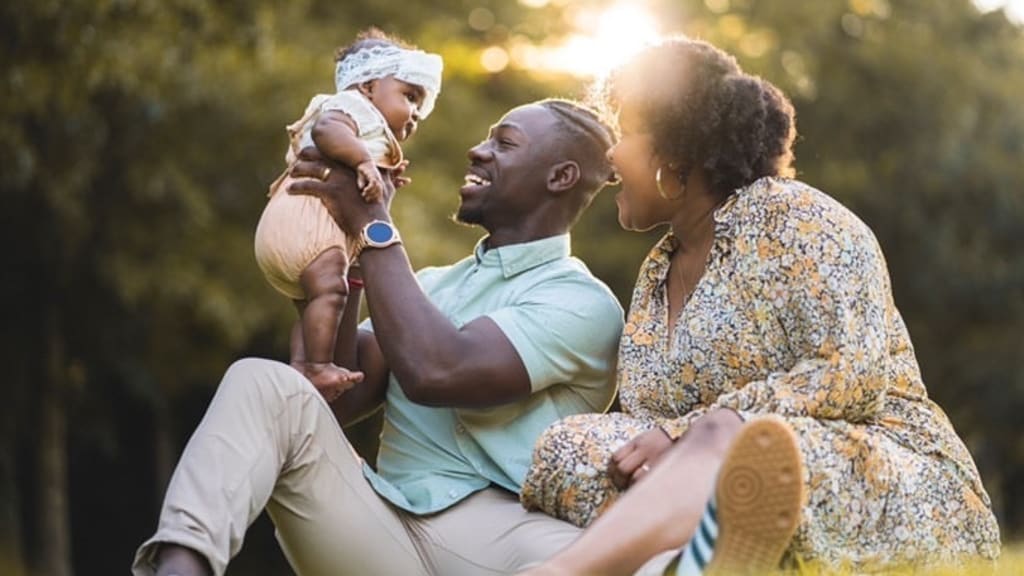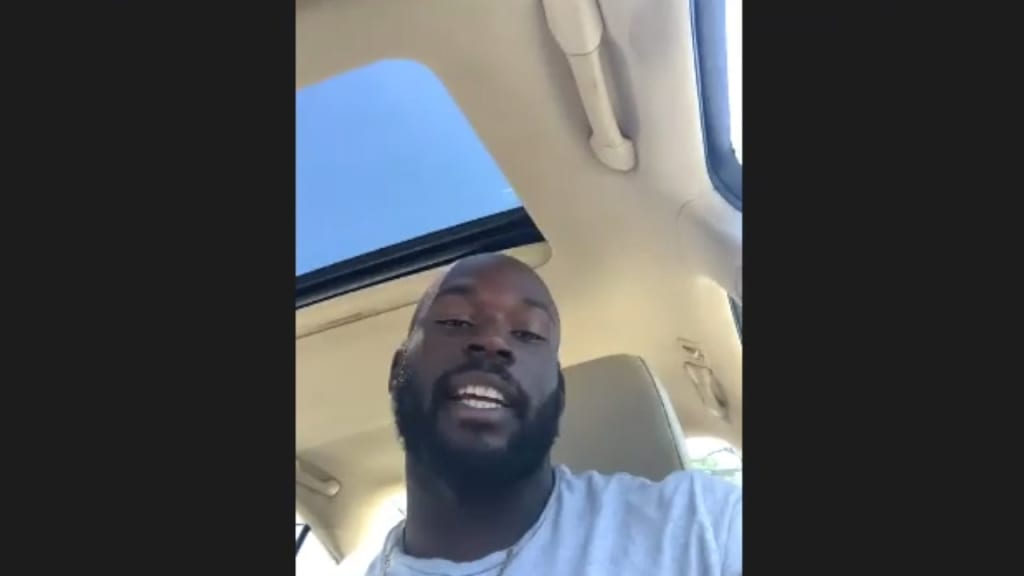Davis, Alford on race, baseball and fatherhood
This browser does not support the video element.
On Feb. 16, Blue Jays outfielder Jonathan Davis and his wife Hannah became first-time parents when daughter Kapri was born. Toronto outfielder Anthony Alford and his wife Bailey (Hannah’s sister) joined the parenthood club on April 20 when they welcomed Stella into the world.
Throughout a pandemic, baseball’s hiatus and civil unrest, both players have begun navigating fatherhood. For Davis, it started with extended time at home while Spring Training was underway, after Kapri inhaled meconium during the birth process, sustained a collapsed lung and remained in the hospital for two weeks. Visits to the hospital are still part of the routine for the Alfords. Stella, who was born at two pounds and four ounces after pre-eclampsia forced a premature birth at 28 weeks and four days, continues to gain size and strength.
Ahead of celebrating their first Father’s Day as dads, Davis and Alford joined MLB.com for a candid discussion about race, baseball and fatherhood. The conversation has been edited and condensed for space and clarity.
MLB.com: How do you navigate fatherhood through everything that’s been going on?
Jonathan Davis: Being a father is a blessing. It humbles you. When you see your child born, it’s this feeling that you can’t describe. … When I wake up to my daughter Kapri now, when I see her and I wake up and she’s talking and smiling, it’s this feeling honestly that you can’t describe. It’s tough, but at the same time as a man, it’s a blessing to be able to nurture this child and this gift that God has given you.

Anthony Alford: My experience has been a little different so far because we haven’t [gotten] the chance to bring her home yet. This time that we’ve spent has been just in the hospital, and up until a few days ago, it was the first time me and my wife and my baby got to be together, because we would have to go in there separately, because of the whole coronavirus thing. But she’s really just changed my whole perspective, and I’ve really learned a lot from her that I feel will help me in not just baseball, but in life period. Going through this whole process of her being in the NICU for going on eight weeks … you literally have to take things one day at a time. You can’t focus on, "OK, what’s going to happen a week from now?"
This browser does not support the video element.
MLB.com: Have you thought about what you want to instill in Stella and Kapri?
Davis: With everything going on today in the world, the first thing is love. … The greatest example of love is sacrifice, and so if they see that in us as fathers, then of course that’s what they’re going to be drawn to. … And then, of course, I want her to be a woman of virtue. I want her to treat other people right.
Alford: One thing I really want to teach her is to have a mind of your own. Truly do what makes you happy. Don’t worry about mama; don’t worry about daddy. Follow your heart, do what makes you happy, because at the end of the day if she makes a decision to make me happy or make anybody else happy, she has to live with that. … I want her to be able to think for herself, don’t think the same way, don’t believe something just because society tells you to believe it or because it’s the way that they think. I want her to have a mind of her own, and just be happy.
This browser does not support the video element.
MLB.com: Jonathan, you shared the R2C2 conversation that CC Sabathia had with Chris Young, Prince Fielder, Edwin Jackson and Cameron Maybin, and they were talking partly about raising Black children. How much thought had you given to that before, and how much do you think about that now?
Davis: There are things I would have to tell my daughter that another person wouldn’t have to tell their daughter. So having those conversations about it, it’s going to happen. That’s something that I didn’t really think about my dad and my mom [having] to tell me. It’s like, "If you see this, you probably want to go the other way." You don’t want to just be hanging around anybody. And it doesn’t have to be so bluntly, but at the same time those are conversations that had to be had, because the truth is the truth and … she’s going to have to experience things as a Black woman that other races don’t have to deal with. So I have given it a lot of thought lately.
Alford: The playing field isn’t level for Black kids. … That’s why I want to be able to create those extra opportunities for my daughter, because the world isn’t going to give it to her. Just her skin colour alone is going to be a threat to some people. … And I’ve had to go through it like, "You’re only fast because you’re Black," or "You’re only this because you’re Black," and you just kind of laugh it off. But I’m going to teach her to stand up for herself, though in a respectful way. Don’t take none of that. They can say they’re joking, but at the end of the day, it’s still disrespectful and I don’t want my daughter being disrespected. So stand up for what’s right, obviously what she feels is right or what she believes in. But I don’t want her to just have to laugh it off because she feels like she has to.
This browser does not support the video element.
MLB.com: Do you have confidence that when you do have to have these talks with your daughters or other future children, do you think things are truly getting better?
Alford: I think so. What we’re going through right now, I think we’re forced to have a conversation about it. It has to start with people shining a light on these issues. But I think in order for us to have real change, it’s got to start within the system, a system that wasn’t designed for African Americans, especially in America. I can’t really speak on any other country, but bills are going to have to be passed, new laws are going to have to be created. We’re going to have to put the right people in leadership positions, people who are going to level the playing field, not only fight for equality, but fight for equity. But I think we’re on the right path. We have a lot of momentum right now, but we have to continue to apply that pressure, because it’s going to have to change within the system. It’s not just going to be from having a conversation. The conversation’s the start of it, but it’s definitely going to have to happen within the system.
Davis: When you’ve seen any type of change in history, especially involving unity of people in terms of a nation, or the United States, it’s been action. Of course you speak out and you protest and you say what needs to be said. But at the end of the day, if you don’t do something about it, then I think you’re pretty much just talking. The Bible says: "Faith without works is dead." Simple as that.
Alford: The fight isn’t just like all Black people coming together. It’s literally going to take everybody to come together to change the system. I’m talking about Black, white, Hispanic; all different races are going to have to come together and fight for one cause. Because if it’s just Black people, we’re 13 percent of the population. We’re a minority. We can’t make that change on our own. It’s going to take everybody joining with us and fighting for what’s right.
This browser does not support the video element.
MLB.com: Do you remember when you realized that people were treated differently because of their skin colour?
Alford: I never really was worried about being treated different, but sometimes I had like a racist person on a team, or [someone] who didn’t feel like I deserved the position, and they’ve used racial language towards me … I do remember the first time someone called me the N-word, but I can’t say as far as in sports where I was treated different because I’m Black.
Davis: That’s a difficult question for me, because I feel like I’ve experienced it a lot. But the thing is with me it’s always been like small things that I’ve kind of, like I said, just considered nothing. … [But] I see things from a different eye now that all this is going on, and it makes me want to do something about it, because in the past it’s like I kind of had my eye on just being successful and I didn’t view things as offensive to me. I kind of just brushed it off, and I think now seeing what all is going on, in terms of equality and justice, like it’s not just about me now. It’s about everybody.
Alford: I’m tolerated by a lot of people, but not necessarily accepted, and I feel like that on a lot of different occasions. And don’t get me wrong … I’m not talking about everybody. But I’m just saying, just I know how a lot of people think as well. You cheer for this African American athlete on Sundays during the football season, but you’re saying how you support the confederate flag and how you’re making these white supremacist comments on Monday. That goes to show me that you don’t care about me as a Black person. You just care about what I can do for your team. … I’ve had an interaction with a police officer, me and my wife and one of my best friends from high school and … that was probably one of the few experiences that I had with someone just simply ... like racial profiling. That experience I will never forget. I asked myself, "If I wasn’t Black, or if I was white, would that experience have gone different?"
This browser does not support the video element.
MLB.com: What has impacted you the most in the way that you want to be dads?
Davis: My dad and my mom, as well, they made a lot of sacrifices, and they just loved me as parents, and they were very strict, in terms of me getting my things done, education, doing what’s right, my faith. And so I think I won’t be as strict on Kapri. I feel like I want to be a father who’s like very understanding, but at the same time can discipline when need be, just depending on her love language, too, because some people need hard love. I would definitely say I would pull from my dad and my parents, and just using the Bible, too, to guide me, because that’s the cheat sheet, from my perspective.
Alford: I want us to have that good father-daughter relationship where she feels like, probably like Kobe and Gigi [Bryant] were, [we have a] tight relationship. She’s going to be my best friend. So hopefully she’s interested in the same things that I’m interested in.
This browser does not support the video element.
